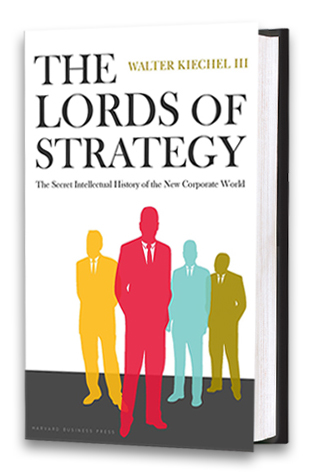“There are three strands to the narrative, woven into a single braid. First is the history of the critical ideas, how they were devised, out of what forerunner materials, and in response to which particular problems. The second and third strands are the stories of people—Bruce Henderson, Michael Porter, Tom Peters, and others—and of organizations, companies that struggled to put the new concepts to work, consulting firms that fostered so many of the ideas, and business schools that turned strategy into an academic discipline. There were and are many lords of strategy, not just the original thinkers, but also a swelling progress of executives rendered more lordly through its use.”
Kiechel, Walter. “The Lords of Strategy: The Secret Intellectual History of the New Corporate World.”
I decided to read this book because I was interested in understanding how the strategy firms came about and how different frameworks, theories, ideologies came about. Certainly, I wasn’t disappointed, rather I was overwhelmed maybe because it was a 760-page book or because it did inform and stretch my thinking. It took me on the journey of how the top 3 consulting firms ( Mckinsey, BCG, Bain) came about, elucidating on the ideologies that drove it’s founding operations and how they gained acceptance in a world that seemed to be doing fine and didn’t care about strategy. It’s quite fascinating that prior to the 1930s there was nothing like strategy and all companies did was corporate planning.
It made me appreciate the input of academics to the strategy industry, Academics such as Micheal Porter who changed the curriculum at Harvard business school introducing a custom course on strategy via his findings from his bestselling publication Competitive strategy, Tom peters who got everyone to appreciate the role of human behavior in strategy formulation through his best-selling book In search of excellence. I am pretty much convinced that with sufficient information and good thinking, new ways to analyze and solve issues will always be created. The fact that the business world is experiencing rapid change means that with time some frameworks and models will soon be irrelevant hence needing replacement, I’d be on the lookout for what I can add, after all, those who have made contributions don’t have two heads.
The answers to the question of ‘where was strategy when the Global Financial system collapsed?’ suggest two things, that the earlier boom in the financial market made the CEOs deaf to the counsel of consultants as the CEOs only had their sights how to make more profit, another more ‘responsibility accepting’ view was the failure of the consultants to properly factor in systematic risk in their analysis and projections. One thing is certain in this new generation where most CEOs have MBAs and the global business arena filled with complexities is ever changing, The bar is constantly being set higher for consultants, the exceptional is fast becoming the expected.


